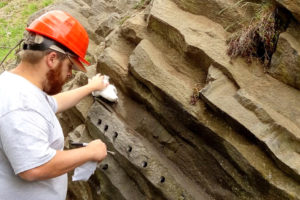
Highlands geology senior Jeff Falance extracts rock core samples from an extinct volcano in the Tlustec quarry in the Czech Republic.
Las Vegas, N.M. – A Highlands University geology student participated in a research expedition to the Czech Republic and Poland that will shed new light on how extinct volcanoes function. The research can potentially help predict eruptions in active volcanoes.
Jeff Falance, a 28-year-old senior from Santa Fe, New Mexico, joined European scientists and Highlands geology professors Jennifer Lindline and Michael Petronis in what Falance called a once-in-a-lifetime research opportunity.
“The purpose of this research is to expand our understanding of diatreme volcanoes, which are characterized by short-lived but violent initials explosions when magma intersects the water table,” Falance said. “The Czech Republic is a special place because it has so many diatreme volcanoes that have been quarried out and exposed.”
During the research expedition, Petronis drilled rock samples in the Zúpeky and Tlustec quarries in the north central Czech Republic.
Falance extracted and labeled the rock samples Petronis drilled and used global positioning systems – GPS – to map the location of the samples in the quarry to help create a sequence of the volcano’s eruptive events.
“My research focuses on better understanding what goes on under a volcano, which means how the lava flows underneath and out of the volcano,” Petronis said. “Dr. Lindline’s research focuses on the mineralogy of the extinct volcanoes and how the different lava flows correlate.”
Falance said the most valuable aspect of the field research experience was connecting his undergraduate classroom knowledge to the professional world, using his critical thinking and problem-solving skills on-site.
“I gained an understanding of how research progresses from an idea to a scientific hypothesis,” Falance said. “I also learned that there’s a big team component of geologic fieldwork, with a lot of collaboration and discussion.”
He said that while Lindline and Petronis are passionate about geology in the classroom and during local fieldwork, the Czech and Polish fieldwork showed them in another dimension.
“It was great to see Dr. Lindline and Dr. Petronis in their element in the field. It was exciting and made me see possible career paths for geology,” Falance said.
Falance is also assisting Highlands geology graduate student Sarah Shields on her thesis research she started in summer 2015 in the Czech Republic.
Shields’ thesis studies the growth and eruption of the Zápuky diatreme volcano. She was also part of the expedition to the Czech Republic and Poland in May and June. This summer, Shields is a Highlands exchange student with Blaise-Pascale University in France.
“This landscape in my study area is formed by volcanic activity, and the ancient volcanic plumbing systems are preserved,” Shields said.
Falance said it was valuable to work with a knowledgeable peer like Shields who is more advanced than he.
“Sarah is extremely dedicated to her research and its quality,” Falance said. “At the same time, she’s very patient and takes the time to explain its importance. I helped her analyze the Czech rock samples she collected last summer in the Paleo-Rock Magnetic Lab at Highlands.”
Since 2012, the National Geographic Society, National Science Foundation and the Highlands Research Office have funded Highlands geology faculty research and five students’ thesis projects in the Czech Republic through grants awarded to Lindline and Petronis.
The volcanology research project is a collaboration between Highlands, the Czech Geologic Survey, Blaise-Pascale University and Charles University in Prague.
